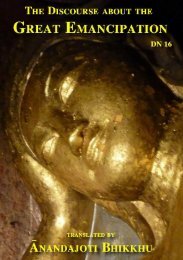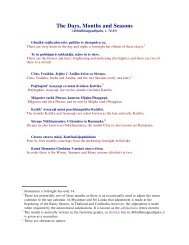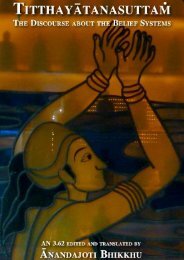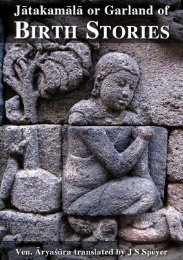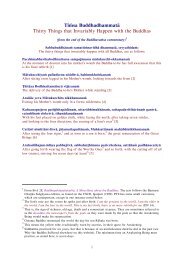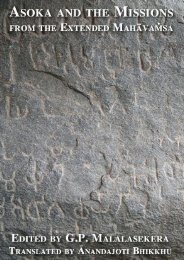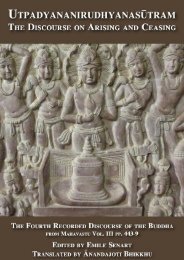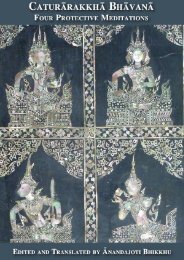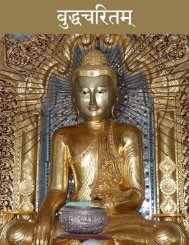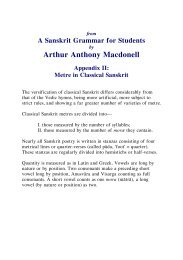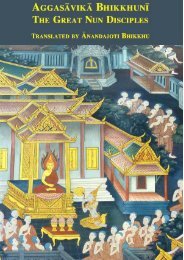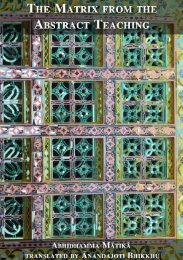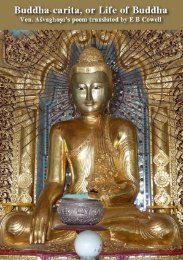MahÄkhandhako The Great Chapter - Ancient Buddhist Texts
MahÄkhandhako The Great Chapter - Ancient Buddhist Texts
MahÄkhandhako The Great Chapter - Ancient Buddhist Texts
Create successful ePaper yourself
Turn your PDF publications into a flip-book with our unique Google optimized e-Paper software.
<strong>The</strong> <strong>Great</strong> <strong>Chapter</strong> - 30<br />
sabbasaṅkhārasamatho, sabbūpadhipaṭinissaggo,<br />
the tranquilising of all processes, the letting go of all bases for cleaving,<br />
taṇhakkhayo, virāgo, nirodho, Nibbānaṁ.<br />
the end of craving, dispassion, cessation, Emancipation. 72<br />
Ahañ-ce va kho pana Dhammaṁ deseyyaṁ pare ca me na ājāneyyuṁ<br />
But if I were to teach the Dhamma and others did not understand me<br />
so mamassa kilamatho sā mamassa vihesā.” ti<br />
that would be tiring for me, that would be troublesome to me.”<br />
Apissu Bhagavantaṁ imā anacchariyā gāthāyo paṭibhaṁsu pubbe assutapubbā:<br />
Further these truly wonderful verses, 73 unheard previously in the past, occurred to<br />
the Gracious One: 74<br />
“Kicchena me adhigataṁ halan-dāni pakāsituṁ<br />
“Now is it suitable 75 for me to explain what was attained with difficulty<br />
Rāgadosaparetehi nāyaṁ Dhammo susambudho.<br />
For those overcome by passion and hatred this Dhamma is not easily understood.<br />
Paṭisotagāmiṁ nipuṇaṁ gambhīraṁ duddasaṁ aṇuṁ,<br />
Going against the stream, 76 it is profound, deep, hard to see, subtle,<br />
Rāgarattā na dakkhanti, tamokkhandhena āvuṭā.” ti<br />
Those delighting in passion, 77 obstructed by darkness, will not see (it).” 78<br />
72 Two versions of this reflection are found in Girimānandasutta (AN 10:60) where they are<br />
known as Virāgasaññā and Nirodhasaññā.<br />
73 Comm: anacchariyā ti anu acchariyā; rather than being derived from na + acchariya, not<br />
wonderful, which gives the opposite meaning.<br />
74 As well as the following Lalitavistara 25.1 has another verse in Jagatī/Tuṭṭhubha<br />
metre on the hesitation: Gambhīra śānto virajaḥ prabhāsvaraḥ, prāpto mi dharmo<br />
hyamṛto ’saṁskṛtaḥ, deśeya cāhaṁ na parasya jāne, yan-nūna tūṣṇī pavane vaseyam;<br />
deep, peaceful, unstained, luminous is the unconditioned Deathless state attained by<br />
me, I shall not teach to other people, what if I were to live quietly in the forest<br />
75 Comm: halan-ti ettha hakāro nipātamatto; alan-ti attho.<br />
76 Comm: Nibbānagāmin-ti attho; going to Emancipation is the meaning.<br />
77 Comm: kāmarāgabhavarāgadiṭṭhirāgena rattā; delighting through delighting in sensuality,<br />
delighting in continuity in existence, delighting in views.<br />
78 cf. Mahāvastū vol. iii. p. 314, has the verses in reverse order, and has a different<br />
last line: pratiśrotagāminaṁ mārgaṁ gambhīraṁ durdṛśaṁ [mama], na rāgaraktā<br />
dracyanti alaṁ dāni prakāśituṁ, kṛccheṇa me adhigato alaṁ dāni prakāśituṁ,<br />
anuśrotaṁ hi vudyanti kāmeṣu grasitā narāḥ; the last line means: those people who<br />
grasp at sensual pleasure are said to be going with the stream. Lalitavistara is<br />
similar.



